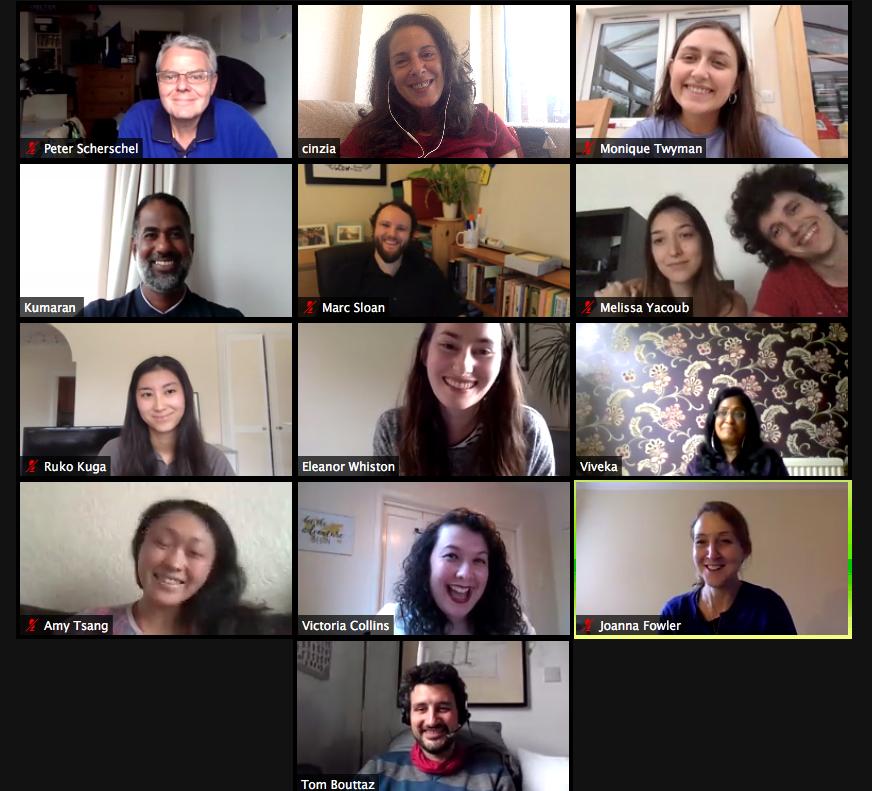As the dust settles on COVID-19's first wave, we can ask ourselves: who are the unsung heroes that helped get us through it? There's no doubt that our biggest heroes are the NHS staff, teachers and key frontline workers who've toiled night and day at great risk to keep vital services running.
By quarantining we've all played our small part in protecting these workers, often at great personal cost. Helping us minimise this cost has been the work of less well-known heroes. These are the charities, mutual aid groups and non-profits propping up society by looking after our communities, the vulnerable and the disadvantaged. But quarantining suddenly forced many of these services to go digital or go bust, turning a difficult job into an almost impossible one.
Who helps the helpers?
In a short amount of time, the COVID-19 pandemic dealt volunteer support services three knockout blows:
- An overwhelming surge in issues related to mass unemployment, poverty, health, bereavement, isolation, mental health, addiction and much more. This created a situation where support services were needed by the population more than ever before.
- At the same time, there was no money to pay for those services as traditional funding channels collapsed with the closing of charity shops and cancellation of fundraising events, all amidst the prospect of the deepest recession in decades.
- And finally these services, which traditionally had been offered in person by volunteers on the ground, now had to be served digitally.
This is what happens to volunteer services when they need digital help:
I have a large mutual aid group. Running a full blown volunteer service with 30 key contacts, 500+ volunteers, 3000 fb members, 20+ local whatsapp groups. I need Ops help!
—A UK-based Mutual Aid Group
We are working with the NHS to build out our existing platform used in care homes to be able to be used to track development of CV19, helping to manage demand on health resources. We need front end Angular developers. We are building this right now.
—Safe Steps
I am trying to set up a platform to inform the Senegalese community about the corona virus. I set up a Google doc drive but I cannot put the link or audio into the different folders. Maybe we can use another platform . Can you help please?
—Senegalese community group in London
How does a volunteer service dealing with unprecedented demand immediately move online, with no budget?
A new type of volunteer is needed in a crisis like this, a voluntrepreneur - tech savvy, equipped with digital skills, and thanks to furloughing schemes, plenty of time to build solutions and help.
And to get our support services back online, we needed a new kind of workforce, a digital home front. Here's how I contributed to creating this workforce and the amazing impact it's had supporting those in need around the world.
Building the voluntrepreneur workforce

At the start of the crisis, a Slack group was created for technologists who wanted to help. Some friends and I quickly joined the rapidly growing community, which started calling itself code4covid.
What set this group of people apart was that it was filled with highly skilled individuals. Senior staff from companies like Google, Facebook and Amazon. Developers, designers, marketers, project managers, entrepreneurs. All trying to figure out how they could put their skills to good use.
However, I grew concerned that many of the proposed solutions weren't tackling the most vital problems. Despite best intentions, the volunteers weren't always finding ways to help the people experiencing the worst of this.
So I set out to fix that.
Tech support for those supporting others
My birthday this year was memorable in that it fell on the first day of lockdown. So I cancelled my plans and I created Covid Tech Support instead.
It started out as a tech helpdesk for anyone needing help with tech because of COVID-19. To begin with, it was a Google Form and a phone number, both of which brought you to me, and I used my tech experience to help as best as I could.
Covid Tech Support volunteers were absolutely helpful. I was in touch with Marc Sloan via chat and email, and he was very helpful.
—Barbara Révész - Young Classical Artists Trust
I simply wanted to see if anyone would even use the service. It didn't take long for the number of requests for help to become overwhelming...
In the beginning it was mostly mutual aid groups needing help setting up Google docs for their community or looking for online tools they could use.
But I was soon getting requests for developers, managers and designers. Demanding bigger commitments than solving standalone problems. These were coming from projects looking to tackle problems such as contact tracing, volunteer management and socially distanced shopping. And increasingly, charities and non-profits trying to take their services online and not knowing where to start.
We would like to build a new website so we just need to make do with what we have whilst we’re in crisis. Any money we save in fees pays for sessions of support for a vulnerable person. Any advice on website design and build would be appreciated.
—Leigh Williams - Cumbria Alcohol and Drug Advisory Service
Thanks @CovidTechHelp for giving Skills Enterprise FREE tech help during the #coronavirus crisis. Great team, understood the needs of small charity. #NeverMoreNeeded #charity
— Skills Enterprise (@SkillsEnter) April 27, 2020
RT and help get tech support to those who urgently need it https://t.co/FOGpYbMKuX
Finding code4covid community members who could work on Covid Tech Support help requests
I'd already furloughed myself so that I could work on this full-time but could no longer handle the requests on my own, so I turned to the code4covid community for help.
I began matching community members to help requests, connecting those with the specific skillsets needed by organisations seeking support. And because the community was now my most valuable resource, I took the lead in managing it and actively growing its membership.
"I would like to thank you, and the other volunteers who have helped us so far. Your work supports us in helping people regain control and independence on all aspects of life.
—Pete Hoey - Halifax Society for the Blind
Word of mouth and some good press caused traffic to Covid Tech Support to grow and grow. I streamlined my operation with the support of organisations such as Intercom, Airtable, Slack, Typeform, Mailchimp, Zapier and Paiger who kindly donated their services for free.
The volunteers were knowledgeable, experienced and passionate to help. I found having a external perspective especially with regards to our user experience design has been really valuable.
—Debra Ullrich - #ImStaying
BIG thanks to Marc and all the volunteers @CovidTechHelp for your #support & #advice as we move our #mentoring sessions to a virtual platform, enabling us to continue supporting our young people. An excellent service for charities out there in these times @WessexComAction @NCVO pic.twitter.com/8xv3EEnAnx
— Youth Adventure Trust (@youth_adventure) April 3, 2020
Becoming a voluntrepreneur
At each step of the way I put my entrepreneurial experience to good use. I sought out users before I built anything and validated the concept by manually providing the service myself. Doing this time and time again taught me which parts of the process needed to be automated, and I hustled for off-the-shelf solutions wherever possible. I tracked website visits, submissions, volunteer matches, social shares and set targets.
I partnered with other digital support services such as AbilityNet, Digital Candle and My April to share projects and resources. I've also been feeding what I've learned to the Greater London Authority to help plan their response and helped guide the Western Cape government in South Africa in setting up their own GoDigital initiative.
Covid Tech Support has been brilliant - Ben has been a complete star and helped us get up and running with the tech but also quickly become part of the team helping us generally with the project.
—Michael Islip - My April
From start up to scale up: building the volunteer dream team
I soon reached a point where I was becoming the bottleneck in keeping things running and would need to start delegating. I needed my own digital support team, and of course, I already had the perfect community in which to find them.
I soon built a code4covid team made up of marketers, managers and designers concerned with growing and engaging the community. With their help, we now have over 1500 volunteers from all over the world.
The commitment from every single person involved and the community coming together to help people in different corners of the world. I cannot ask for a more helpful, friendlier bunch of people than this.
—Covid Tech Support volunteer commenting on the community
I also created a Covid Tech Support team of product and project managers, skilled in understanding project needs, identifying suitable talent and experts in communication. This team has successfully matched volunteers to over 150 projects and continues to deal with 10-20 new projects a week.
Every project, every little win, matching a volunteer after a long search, fixing some little aspect myself, it's been one long highlight.
—A volunteer's personal highlights from working with Covid Tech Support
One of my personal highlights has been working with this group of excellent individuals, getting to know them and sharing in their commitment and dedication.

What happens when you supercharge charities with a digital expert
The success of Covid Tech Support is down to our volunteers' hard work in the organisations we place them into. In three short months we've contacted 550 volunteers and placed over 250 of them.
We've heard amazing stories from the organisations we've supported. For instance, we put together a team of web developers to help Crisis build a 'free webstore' for homeless shelters in 1 week. One of our designers helped Mencap design an accessible directory for local disability support services. An amazing product manager led a team that prevented Afyah from closing down and raised funding so that it could continue to support underprivileged women.

All the volunteers have been exceptional, professional and friendly. The project will have a great impact in restructuring and securing the organisation from imminently closing down.
—Khadija Ahmed - Founder of Afyah Support Group
I'd like to continue working with Khadija for as long as she'd like, she's amazing! My experience with the project has been really positive, Khadija is an incredible person, it's a privilege to work with her.
—Emily Bazalgette after working with Khadija at Afyah
Having provided volunteer help and management to hundreds of projects at this point, the Covid Tech Support team believe that the efforts of our community of digital volunteers will have indirectly impacted thousands, maybe even hundreds of thousands, of the most vulnerable people during the crisis.
Thanks @CovidTechHelp for giving us FREE tech help during the #coronavirus crisis, and helping us to keep on helping others! 🧡https://t.co/mmIRAKwr1L pic.twitter.com/p58JadHimP
— Living Well UK (@livingwellbrum) April 16, 2020
The benefits of being a voluntrepreneur
Many of the community are currently furloughed or unemployed, and so benefit from putting their skills to good use, trying new things out, meeting others during a time of isolation and gaining new professional and personal experience. Some have even found new jobs as a result.
Your volunteers have been more than helpful, they have become a core part of our team (some of them have now gone on to take full time remunerated positions). I think you guys have done an amazing job.
—Kelly Klifa - Testing for All
We've worked with volunteers who have helped on multiple projects, who remain involved for months and who get their friends in on it. For me, it's all about hearing the heartwarming feedback from the projects we've supported, the difference our volunteers have made to people's lives and the amazing people I get to work with. As an extra bonus, I'm also excited to have been shortlisted for the 'Digital Volunteer Award' at this year's Tech4GoodAwards.
Looking forward to the next challenge!
—Anne-Marie Wardlaw, a Covid Tech Support volunteer, after working with the Young Classical Artists Trust
The Digital Home Front
So far I've listed code4covid and Covid Tech Support's successes, but I've come to learn that we're only one operation in an ecosystem of amazing digital support. Since we started I've had the pleasure of discovering similar services like Digital Boost and Furlonteer, localised versions such as Scottish Tech Army and Digital Brighton and Hove, and skill specific services such as Tandem (for marketers) and Helpful Engineering (for hardware).
Each with their own community of skilled volunteers that self-organised in response to a national crisis. Together forming a digital home front, unsung heroes supporting the heroes helping us on the frontline.

I was privileged to be able to help out and see some of the fantastic work people are doing on the front line. It was a lovely chance to be able to help make a difference to their operations and processes.
—Soraya Gallagher, a Covid Tech Support volunteer, after working with Carterton Community Assistance
Thank you so much for your time and wisdom @CovidTechHelp offer help and tech support to all those amazing #notforprofit #covidchampions out there xx
— Recovery helpline 01273 758561 (@kennedystcio) April 4, 2020
And if there's one thing to take from this post, it's that as we look forward and prepare for the possibility of a second wave, there's comfort in knowing that this time we're prepared. The digital home front workforce is in place and I'm proud to have played my small part in putting it together.
But I couldn't have done it alone. I could write an entire blog post about these individuals and the contributions they've made. Thanks to Jules Decol and Cinzia Riccardione for starting the original Slack group. Freddie Fforde for inviting me to it, setting up and leading the initial steering group and coming up with the name Covid Tech Support. Also everyone in that steering group, including Josh Russell, Mike Butcher, Jan Baykara, Ed Saperia, Nathan Young, Eloise Todd. And also to my teams at code4covid and Covid Tech Support, Cristina Munteanu for all of her amazing support, Eleanor Whiston for helping me plan for the future, and the entire voluntrepreneur community.
Also big thanks to Sarah Thickett, Tim Hanson, Freddie, Victoria Collins, Cinz, Cristina, Eleanor and Ruko for giving feedback on this post.
If you need help during the COVID-19 crisis, then let us know here. Or you can help us reach those who may need our help by following us on social media. Or if you have valuable digital skills, from full stack development to social media management, join us today and find a project you'd like to help with.
I'd love to hear how you've helped during the COVID-19 pandemic. Leave your comments below.
